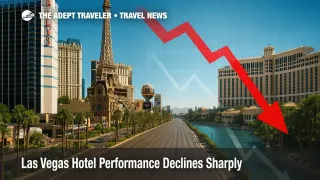Las Vegas Hotel Performance Declines Sharply in Summer 2025

Las Vegas is enduring its roughest summer in years. Preliminary STR data show occupancy down nearly 15 percent in June, while the week ending July 5 brought a 28.7 percent plunge in revenue per available room (RevPAR) to $102.75. Visitor counts from the Las Vegas Convention and Visitors Authority (LVCVA) confirm the slide, dropping 6.5 percent year over year in May. Hot weather, economic jitters, and a notable shortfall in international arrivals-especially from Canada-are eroding demand, prompting resorts to launch aggressive promotions to fill rooms.
Key Points
- Occupancy fell 14.9 percent in June, the worst month of 2025 so far.
- Week ending July 5: RevPAR down 28.7 percent to $102.75.
- International arrivals sank 13.2 percent in June, hurting weekday demand.
- Resorts World, Sahara, and Caesars roll out fee-free or discount bundles.
- Why it matters: Vegas's slump is large enough to pull national U.S. hotel metrics negative this summer.
Snapshot
Las Vegas commands roughly three percent of total U.S. hotel supply, so a sharp swing on the Strip ripples nationwide. STR's early June figures put average occupancy at 69 percent-four points below the U.S. mean-before the late-month tumble to 66.7 percent. Average daily rate (ADR) held above $150, yet the RevPAR gap widened as empty rooms spread. LVCVA's May dashboard shows 3.4 million visitors, 240,000 fewer than a year earlier, confirming a steady volume decline year to date. Airlines have likewise trimmed schedules, with overseas seat capacity down six percent versus summer 2024.
Background
Vegas rebounded quickly after pandemic restrictions lifted, buoyed by pent-up leisure demand and blockbuster events such as Formula 1. By late 2024, however, inflationary pressures and waning savings began to curb discretionary travel. International markets lagged the recovery: Canada, Mexico, and the U.K.-traditionally the top three feeders-never fully regained 2019 levels, and Asia-Pacific traffic remains below half of pre-COVID volume. Meanwhile, resort fees, parking charges, and surging show ticket prices drew criticism, testing price elasticity among budget-conscious travelers. Local analysts flagged the risk of a summer pullback as early as February, but the speed and depth of June's reversal surprised many operators.
Latest Developments
Summer slump deepens
STR's weekly report for June 29 - July 5 ranks Las Vegas last among the top 25 U.S. hotel markets in every key metric. Occupancy slid 16.8 percent to 66.7 percent, ADR fell 14.3 percent to $154.16, and RevPAR plunged nearly 29 percent. Removing Las Vegas from national calculations would leave U.S. RevPAR flat, underscoring the Strip's outsized influence. Preliminary June data signal a 14.9 percent monthly occupancy drop, the deepest of 2025.
International arrivals slide
U.S. International Air Travel Statistics (I-92) show Las Vegas overseas arrivals down every month this year except January. June's 13.2 percent dip accelerated a trend that began in spring, when Canadian inbound traffic softened alongside a weaker Canadian dollar. UNLV economist Stephen Miller attributes the overall slowdown to "dramatically higher uncertainty" that is causing middle-income travelers to pause big-ticket trips. Domestic drive-in visitation from Southern California has also moderated as gasoline prices remain elevated.
Hotels roll out value deals
Resorts are moving quickly to spur demand:
- Resorts World Las Vegas launched the "All Resort, No Fees" package-waiving resort fees, offering free self-parking, and providing $50-$75 nightly credits through September 10. Vice President Shannon McCallum reports a "very large impact," particularly among locals.
- Sahara Las Vegas lets guests choose between ditching the resort fee or taking a $50 daily dining credit.
- Caesars Entertainment promotes 15 percent room discounts plus 20 percent off spa services and attraction tickets.
- The Strat bundles resort fee, taxes, and observation deck access into $49 weekday and $99 weekend "Summer of Value" rates.
- Circa Resort & Casino pitches a $400 "All-In Summer Package" with a two-night stay, $200 in dining credits, and a daybed reservation.
Marketing spend is also rising. The LVCVA approved a 30 percent year-over-year increase-the largest in its history-in late May, touting Vegas as affordable for every budget and tripling investment with key online travel agencies.
Forward outlook
Despite the summer swoon, convention and trade-show bookings paint a brighter picture for autumn. LVCVA chief Steve Hill notes September-through-2026 group calendars are "very strong," and May convention attendance already ran 10.7 percent ahead of 2024. CBRE's John DeCree cautions that a slowdown in group pace would be far more alarming than transient softness, but current leads suggest stable corporate demand heading into Q4 2025.
Analysis
Las Vegas's slide highlights the city's exposure to both economic sentiment and international airlift. With average temperatures topping 100 °F, leisure travelers often postpone Strip vacations until shoulder season; this year, inflation and weaker foreign currencies magnify that seasonal lull. Resorts' swift move to waive fees and sweeten credits shows management's agility and underscores the pricing levers unique to a destination where non-room revenue often eclipses lodging income. From a traveler's perspective, the next eight weeks present rare bargains, especially midweek, though visitors should factor in triple-digit heat and potential pool-capacity caps. Advisors may pivot budget-sensitive clients toward late-summer Vegas stays while steering premium seekers toward September events when rates are likely to rebound. Meeting planners, meanwhile, enjoy greater negotiating power for 2026 blocks, as hoteliers chase long-term base business to offset near-term volatility.
Final Thoughts
Las Vegas's summer downturn, while sharp, aligns with a broader reversion to normal seasonality and macro-driven caution. Aggressive value packages, expanded marketing, and a robust fall convention slate suggest the slump will be short-lived. Travelers willing to brave the heat can capture exceptional deals now, while meeting organizers should lock favorable terms for 2026 before demand tightens. For the moment, though, the Las Vegas hotel performance decline remains the story of the summer.
